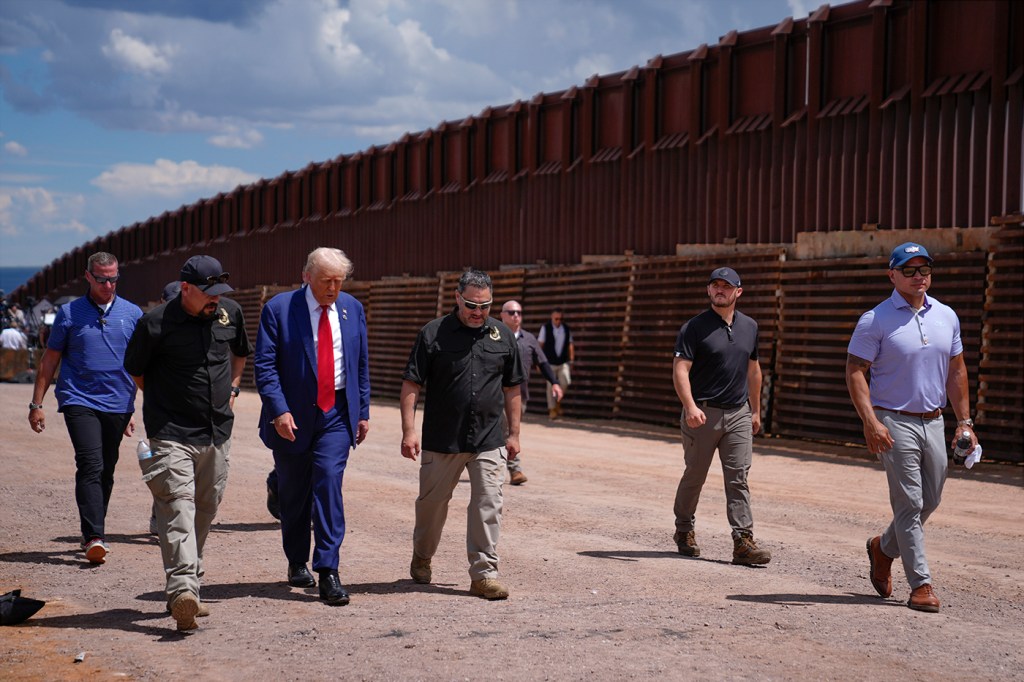Mass deportations are a day one priority for Trump. Economists explain how it could lead to a recession
Donald Trump’s hardline approach to immigration policy could have a major impact on the U.S.economy and labor market –– and not in the way Trump intends, Northeastern experts say.

Immigration was one of the defining issues of Donald Trump’s presidential campaign, and as he prepares to step back into office he has made it clear that mass deportations of undocumented immigrants is a day one priority.
Within his team, there have already been discussions about how to carry out his wide-scale plan in response to the current surge of migrants, according to CNN, starting with those who have criminal records.
Trump also confirmed his intention to declare a national state of emergency and use the military to carry out deportations. Whatever path Trump takes, he has promised the “largest deportation effort in American history,” which some experts say could cost the U.S. billions.
According to the latest Department of Homeland Security estimates, there were about 11 million undocumented immigrants in the U.S. on Jan. 1, 2022. At various points in the last year, Trump and his team have claimed there are anywhere between 10 and 20 million.
Outside of the cost of waging a deportation effort of such an unprecedented scale, some economists say Trump’s policy would leave major impacts on the U.S. economy and labor market –– and not in the way Trump intends.
“When you’re talking about numbers like [this], it’s almost hard to imagine a place that has some immigration that will not be affected by this,” says Shantanu Khanna, an assistant professor of economics at Northeastern University. “Here we might be talking about impacts that will be discernible at the macroeconomic level.”
The last major mass deportation effort was carried out between 2008 and 2013 through the Secure Communities Act and targeted about 400,000 undocumented immigrants. At the time, economists were able to measure the economic impacts of such a large-scale removal of workers, but even that pales in comparison to the scale of Trump’s plan.
Khanna says the stated intention behind Trump’s push for mass deportation is not new: Undocumented immigrants hurt employment opportunities for U.S. citizens, therefore, deporting them will improve employment and economic opportunities for Americans.
However, Khanna says the research on the connection between immigration and employment for native born workers is “quite mixed.”
Mass deportation can result in an increase in employment for the very lowest educated workers that might be competing for jobs with undocumented immigrants, Khanna says. But overall there is a negative impact on the labor market and economy due to a number of factors.
One is that undocumented immigrants take jobs that are largely in sectors like construction, child care and elder care, areas where native U.S. workers are less likely to seek work, Khanna says.
Peter Simon, a teaching professor of economics at Northeastern, notes that the sectors where undocumented immigrants mostly find employment are vital to the U.S. economy, which is largely driven by the service industry, not agriculture or manufacturing.
“People who build houses, people who are in lawn care, people who do daycare, people who put on roofs — all of these kinds of services are just going to go,” Simon says. “You’re not going to be able to find a plumber, an electrician or anybody who can do this kind of work.”
The sudden absence of these low-paid yet invaluable workers would highlight something many Americans are not always willing to acknowledge, says Madhavi Venkatesan, an assistant teaching professor of economics at Northeastern.
“When we have individuals here who are undocumented and completely vulnerable and are inelastic in terms of their labor supply … and you see people taking advantage of them, what the deportation actually highlights, to the extent that it impacts sectors of this economy, is how much we’ve benefited because we choose to be exploitive,” Venkatesan says. “The economic impacts that we face will highlight the type of people we’ve allowed ourselves to become.”
Editor’s Picks
Mass deportation would hit the child care industry particularly hard, Khanna says, which could cause massive ripple effects nationwide for “the labor force participation of native women who rely on these child care centers.”
Workers in those industries who are citizens would also be affected by mass deportation.
“Imagine a construction site where a lot of construction workers are undocumented immigrants, and the supervisor of all these workers is a native worker,” Khanna says. “When all the workers go away, then you don’t need the supervisor either, so this can have a negative impact on native workers’ employment in this way because these are complementary labor inputs.”
The sudden loss of millions of people could also impact local economies because there would be fewer people who are eating at local restaurants and paying for goods and services provided by local businesses.
“It will trickle down very quickly. It won’t just trickle down; it will flood down pretty quickly in terms of the loss of GDP,” Simon says. “That’s what’s going to cost the country. Our growth rate right now is not bad. It’s around 3% or 4%, which is historically about average but lately it’s above average. That’s going to take a hit, and we’re going to feel the difference.”
Coupled with the birth rate in the U.S. sitting lower than what is needed to maintain the country’s workforce and Trump’s proposed tariffs that could hike prices for consumers, Simon says it wouldn’t take long “before the country finds itself in a recession.”
“These tariffs and this deporting idea, it’s just going to exacerbate what could be a bad situation already,” Simon says.











